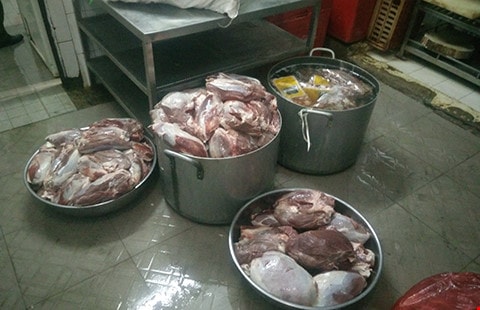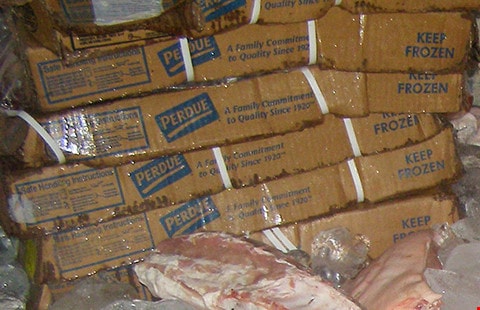Eat frozen buffalo meat, pay for… beef
The price of imported buffalo meat is much lower than domestic beef, so many people have "magically" turned it into beef to make illegal profits.
“Since the beginning of 2016, Ho Chi Minh City has discovered many cases of thawing imported buffalo meat and selling it at the price of fresh beef. This has affected consumers’ health and caused them to lose money,” said Mr. Khuong Tran Phuc Nguyen, Head of the Inspection Department of the Ho Chi Minh City Veterinary Department.
Beef = frozen buffalo meat + chemicals
According to the Ho Chi Minh City Department of Animal Health, on April 15, the Department and the City Environmental Police Department (PC49) suddenly inspected a beef store on Bui Huu Nghia Street (near Hoa Binh Market, District 5) owned by Mr. Nguyen Van S. At the time of the inspection, the team recorded 1,045 kg of imported frozen Indian buffalo meat and beef by-products without quarantine certificates. Some of the buffalo meat was being thawed in water. Mr. S. said that after thawing, the buffalo meat was soaked in chemicals to become fresh beef for sale on the market.
Previously, the Veterinary Department and PC49 also discovered Ms. Nguyen Thi Th. (Hamlet 4, Xuan Thoi Son Commune, Hoc Mon District) defrosting 1,300 kg of frozen buffalo meat originating from India. The inspection team also recorded 500 kg of buffalo meat thawed and prepared to be soaked in chemicals, 1,000 kg of buffalo meat "transformed" into beef and 50 kg of white chemical powder. Working with the authorities, Ms. Th. said that buffalo meat soaked in chemicals to look like beef was consumed at markets, restaurants and eateries in Ho Chi Minh City.
In the first four months of this year alone, at least seven cases of fake beef were discovered by Ho Chi Minh City authorities, with evidence amounting to dozens of tons.
According to statistics from the veterinary industry, every week cold storages in Ho Chi Minh City receive over 1,000 tons of frozen buffalo meat and by-products. Meanwhile, consumers can hardly find imported buffalo meat for retail sale in any market. "So is this imported frozen buffalo meat "magically" distributed to consumers under the name of fresh beef?" - Mr. Nguyen questioned.
 |
 |
| Thawed imported buffalo meat was discovered at Mr. Nguyen Van S.'s facility (District 5, Ho Chi Minh City). The meat was then thawed and sold to customers at the price of fresh meat. |
"Huge" words, regardless of consequences
Ms. Tran Thi Thu, an employee of a frozen goods company in District 1, Ho Chi Minh City, said that currently, buffalo meat imported into Vietnam is mainly from India. The average import price is about 80,000-95,000 VND/kg, even some types are lower at just over 30,000 VND/kg.
“However, when buffalo meat is “magically” transformed into fresh beef, the price is more than 200,000 VND/kg. With the difference doubling, consumers are “pickpocketed” a large amount of money,” Ms. Thu said.
In addition, many traders said that it is difficult to distinguish between buffalo meat and fake beef because the meat fibers are similar. Moreover, buffalo fat after being marinated has a yellow color similar to beef fat, so it is also difficult to distinguish. Some people also soak buffalo meat in cow blood to make fake beef smell like real beef, easily fooling consumers.
According to Dr. Phan The Dong - Head of Food Safety Project, Hoa Sen University, buffalo meat soaked in dirty water to defrost not only loses its sweetness but is also very susceptible to bacteria, posing a risk of poisoning. "In addition, using chemicals and fragrances of unknown origin to turn buffalo meat into beef has a significant impact on consumers' health" - Dr. Dong noted.
Clause 1, Article 26 of the Veterinary Ordinance states: “The owner of an animal or animal product must declare to the competent veterinary agency before transporting the animal or animal product. The veterinary agency is responsible for carrying out quarantine according to regulations and issuing quarantine certificates.” According to the above regulations, all animals and animal products transported or traded within the province must be quarantined.
Meanwhile, Clause 1, Article 37 of the Veterinary Law (replacing the Veterinary Ordinance and effective from July 1, 2016) stipulates: “Animals and animal products subject to quarantine before being transported out of the province must be quarantined once at the place of departure”. This means that after July 1, 2016, animals and animal products transported and traded within the province are not subject to quarantine, creating opportunities for imported frozen meat to thrive. This puts consumers at high risk of eating thawed imported meat but having to pay for fresh meat. Mr. KHUONG TRAN PHUC NGUYEN, Head of Inspection Department of Ho Chi Minh City Veterinary Department On April 30, the Ho Chi Minh City Veterinary Department and the Environmental Crime Prevention Police Department (PC49) of the Ho Chi Minh City Police suddenly inspected Phu An food store (7 Dao Tan, Ward 5, District 5, Ho Chi Minh City) owned by Mr. Hang Phu An. Here, the authorities discovered 75 kg of chicken meat, 15 kg of chicken feet, and more than 30 kg of pork ribs, all of which were imported frozen goods without quarantine certificates. Some of them were being thawed for sale to customers. |
Legal


